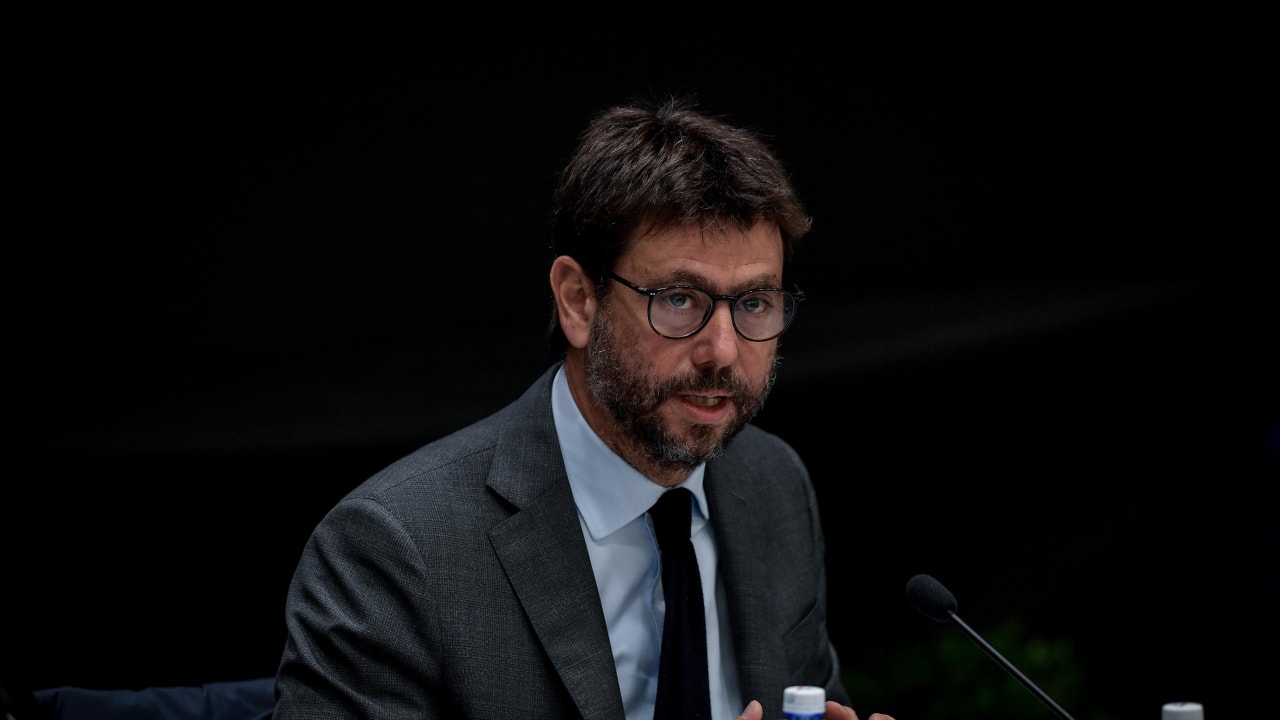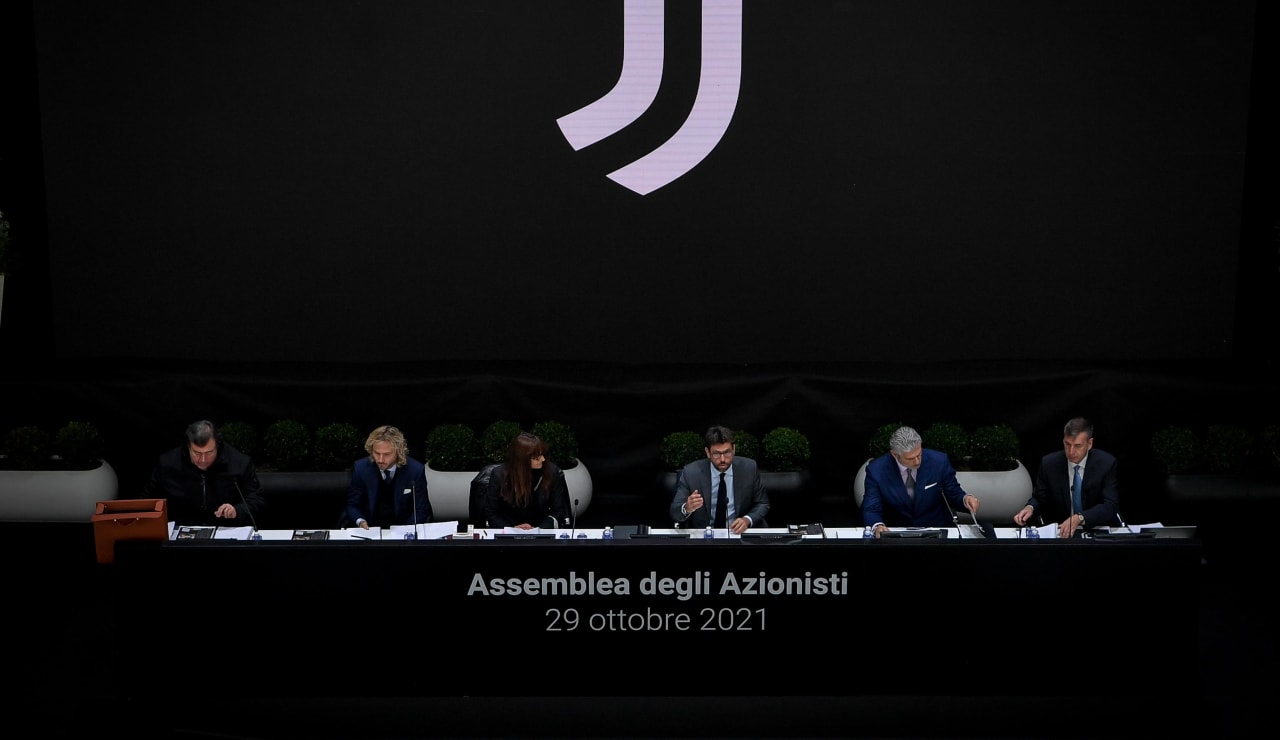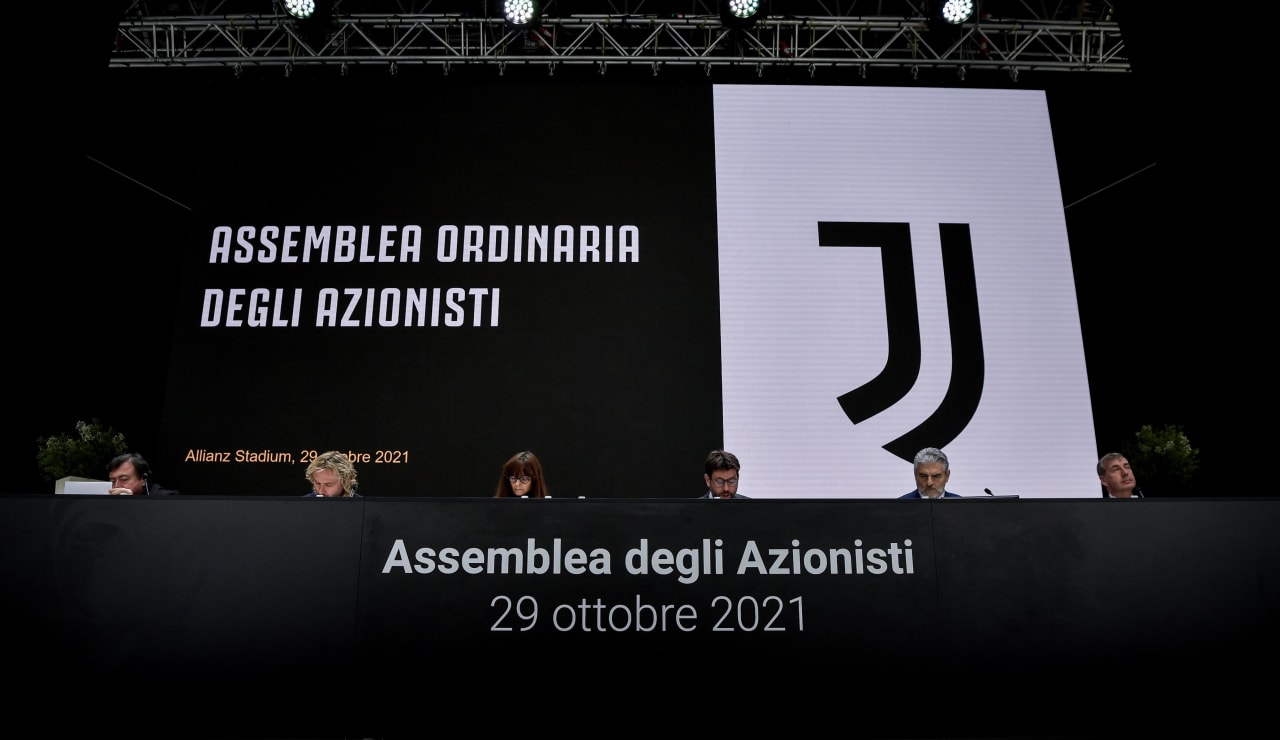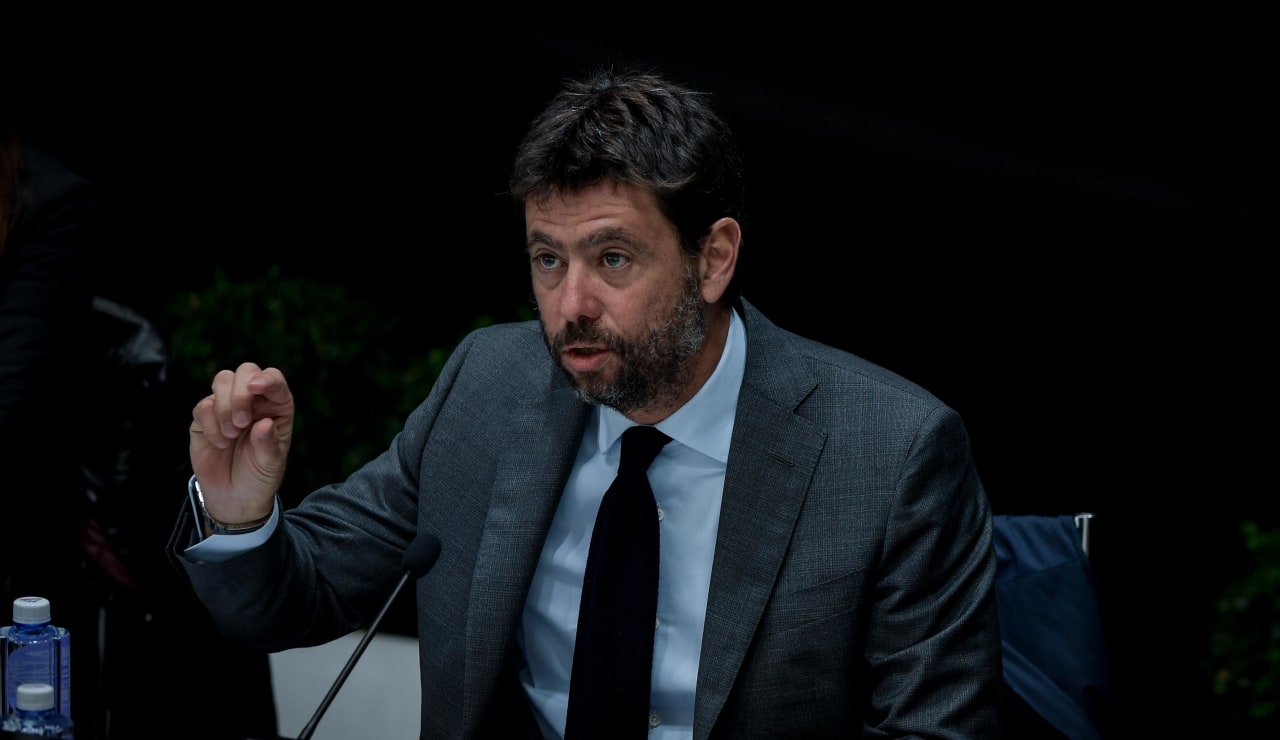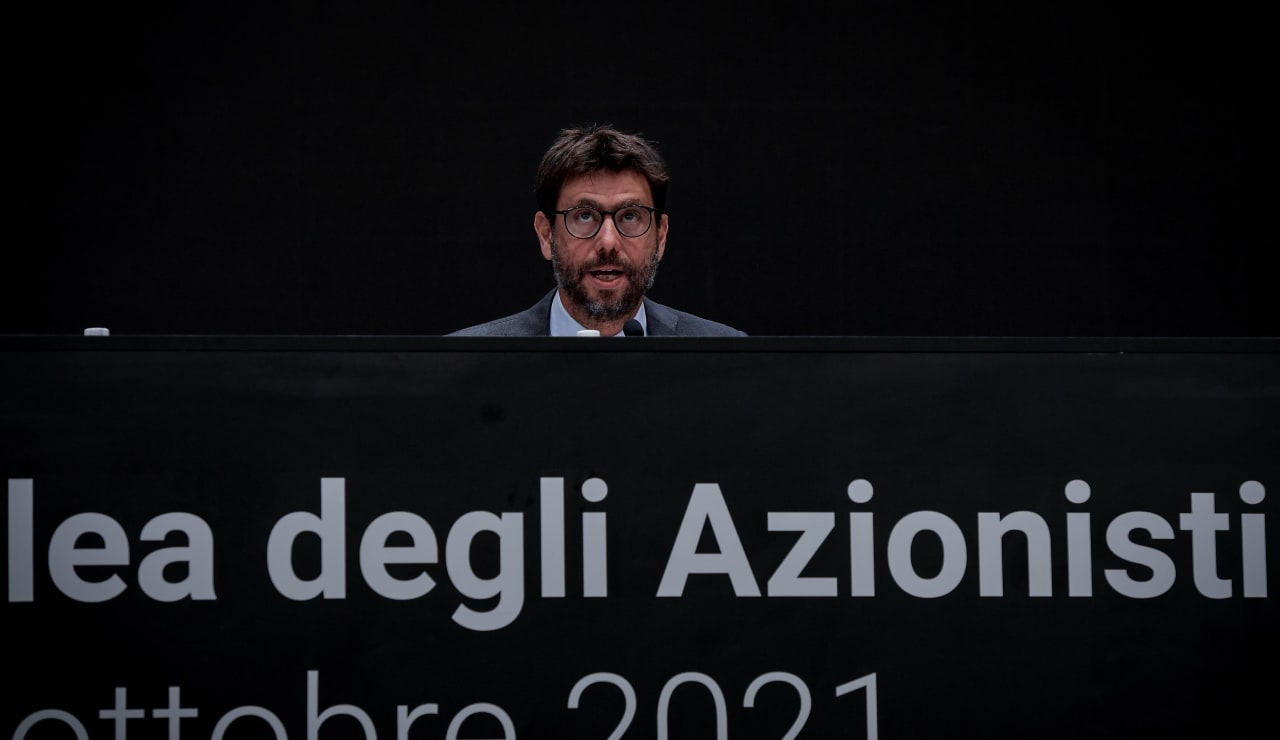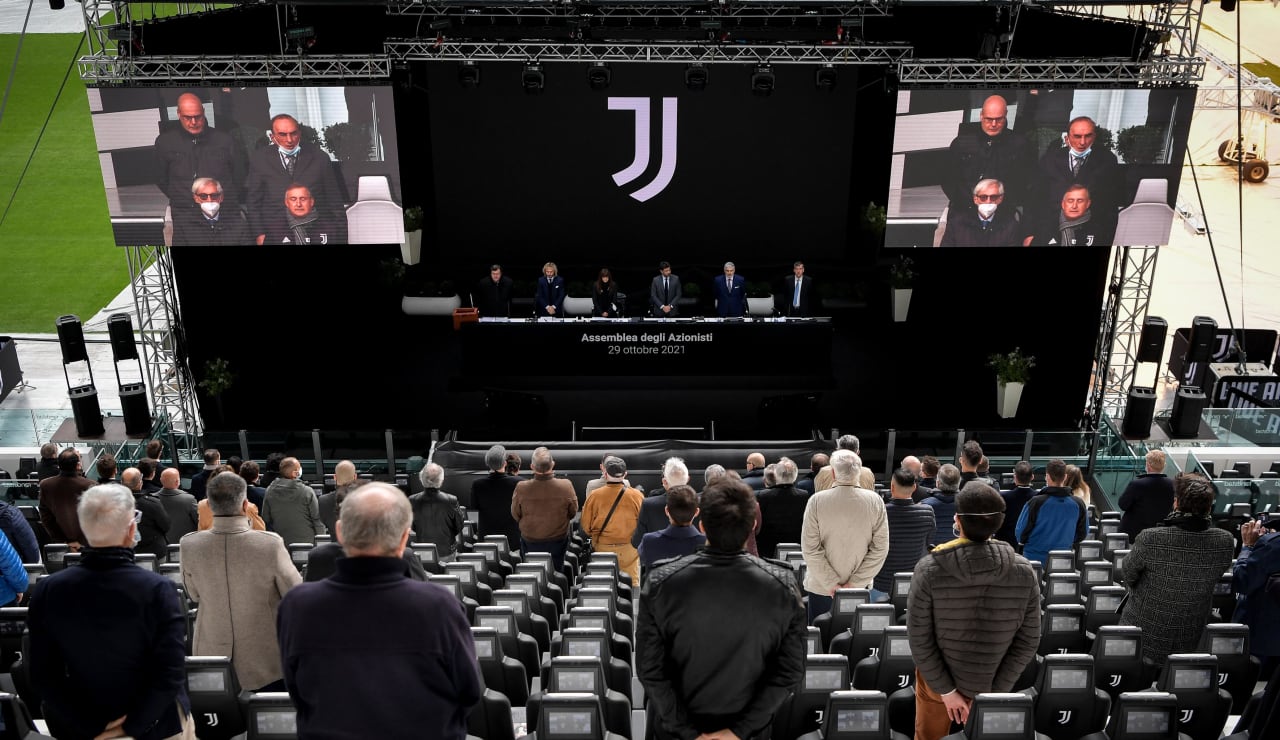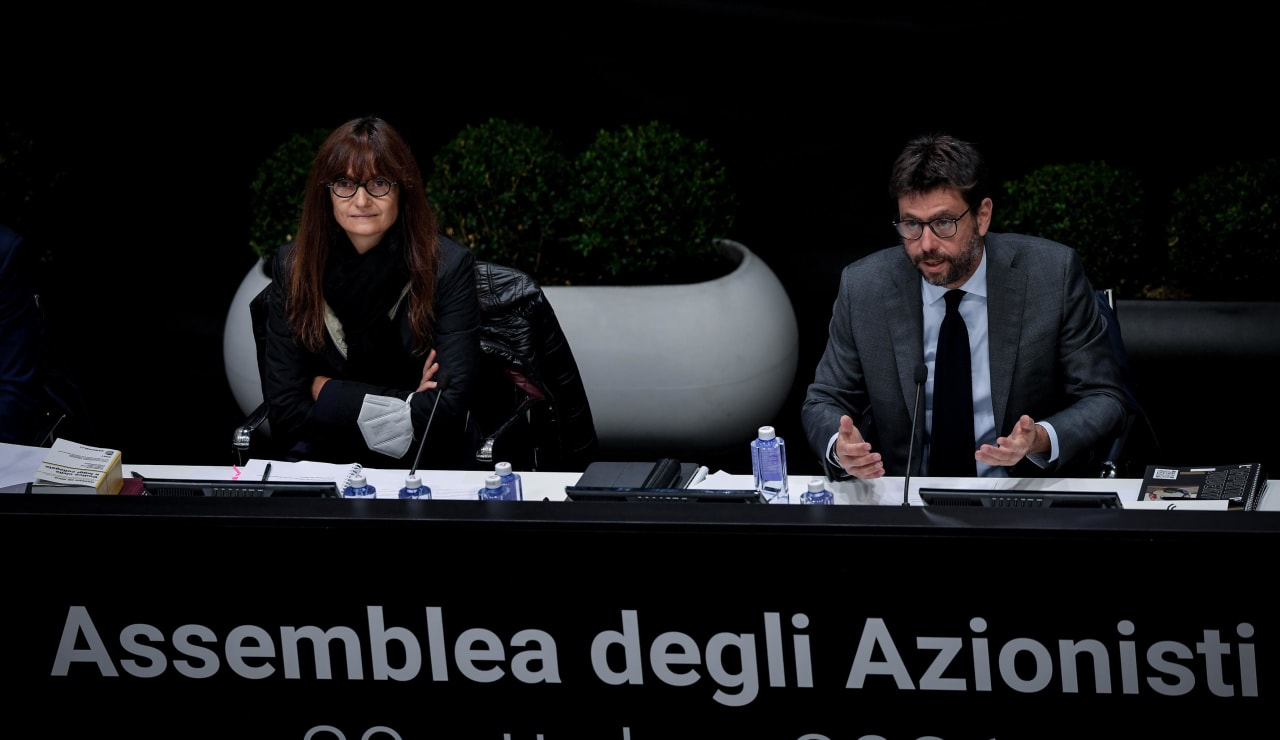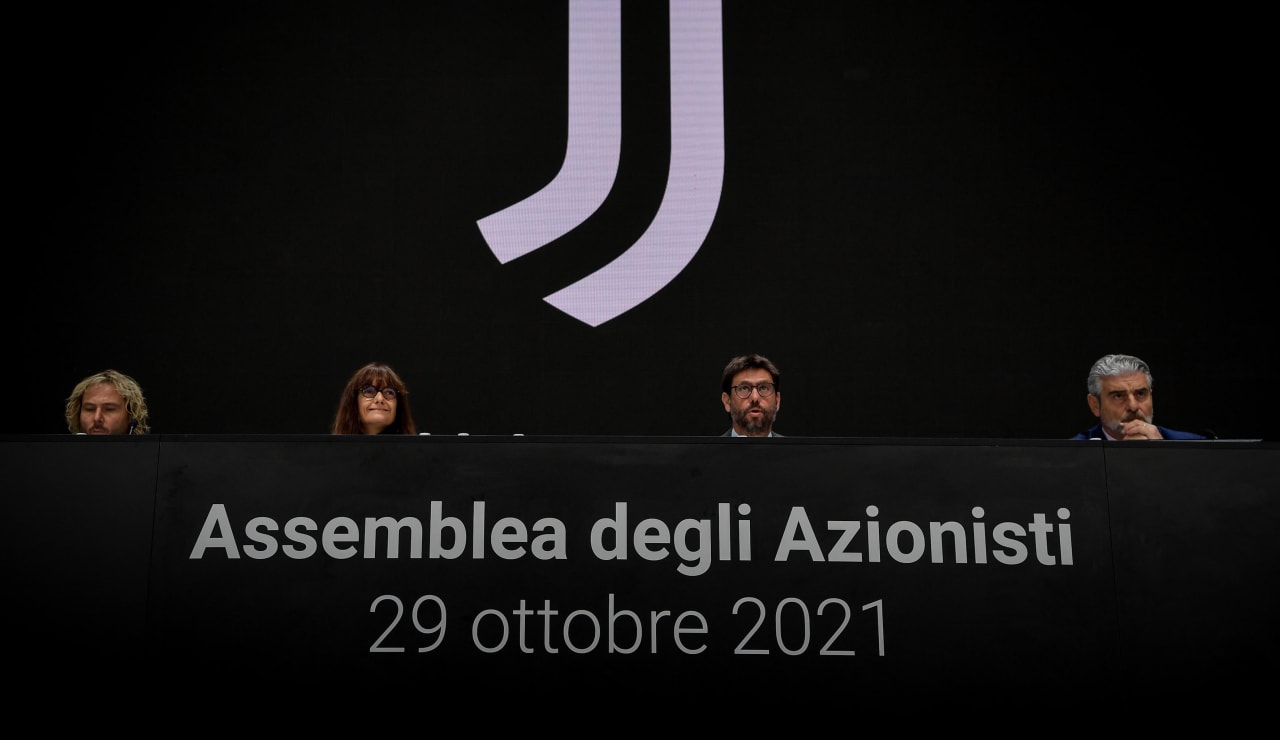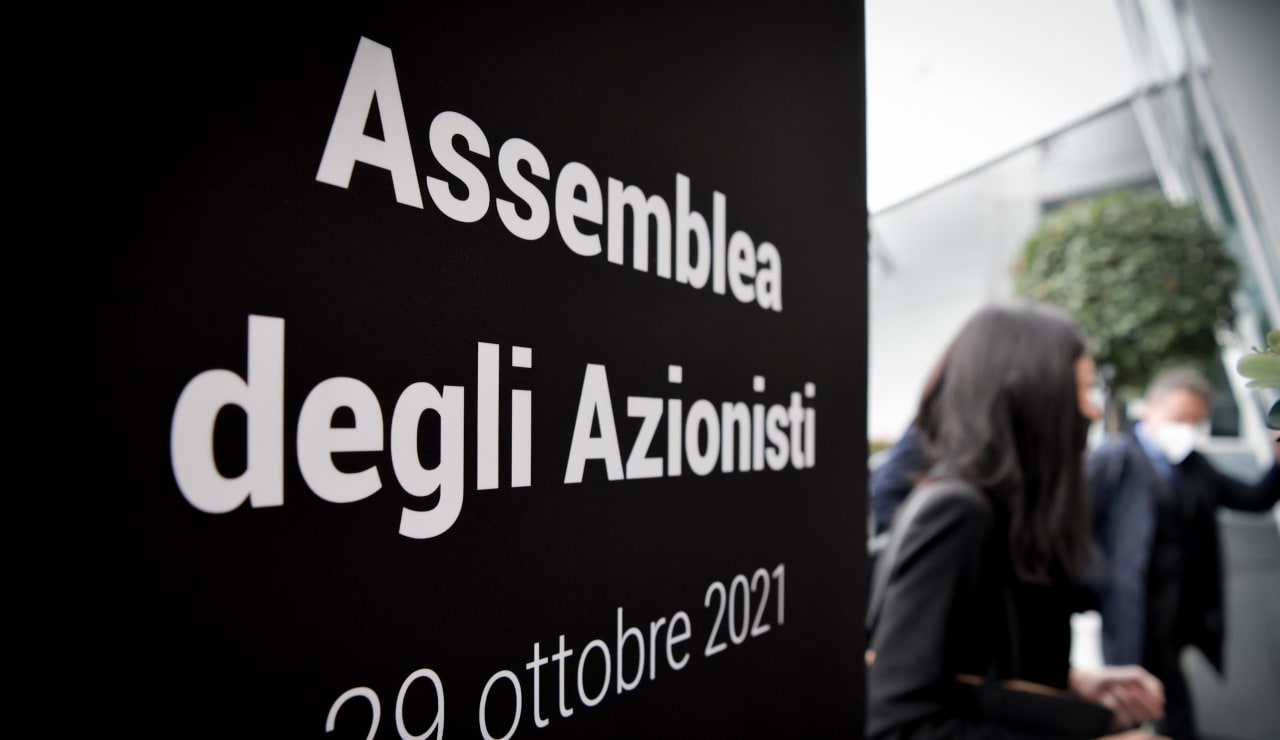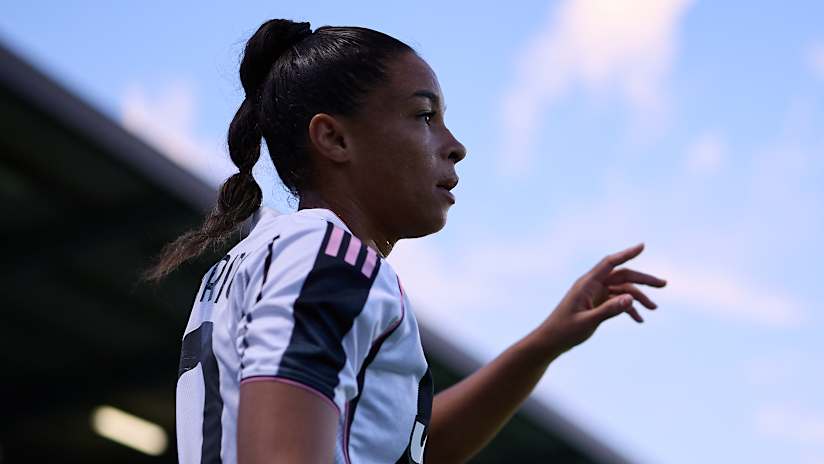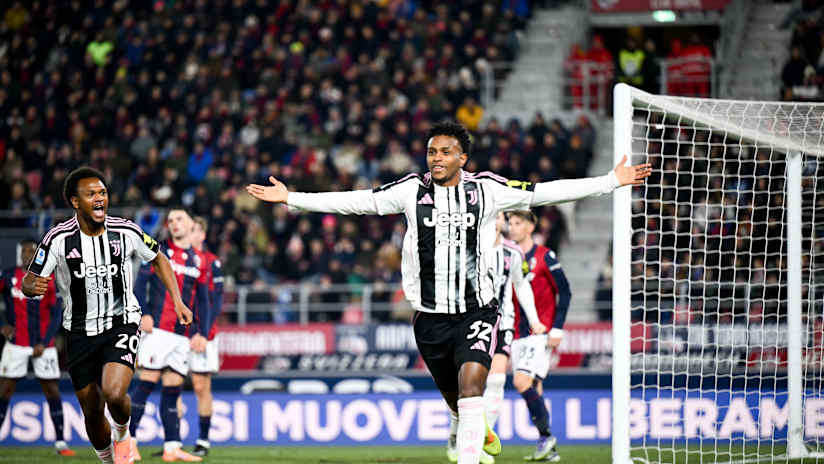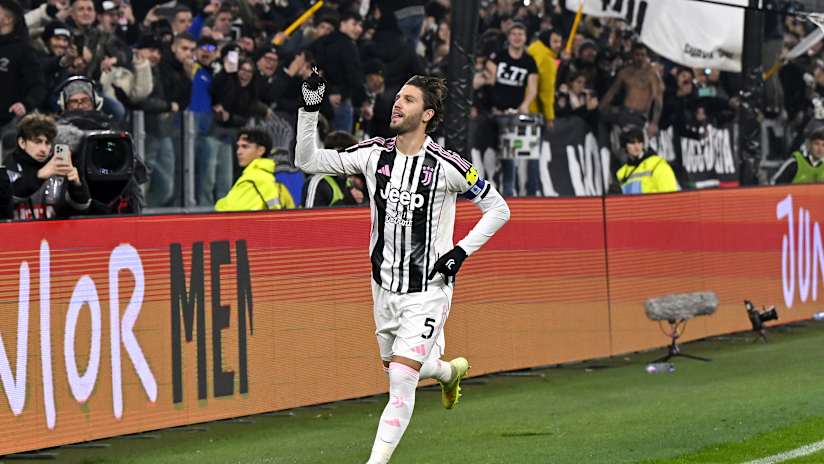29 October 2021
After watching a video dedicated to the team and the club, the Juventus Shareholders' Meeting began with a minute's silence in memory of Giampiero Boniperti, who passed away on 18 June.
Club chairman Andrea Agnelli then delivered his introductory speech.
Welcome to Allianz Stadium, our home, the home of our team.
If I'm not mistaken, we're the only club to hold our annual shareholders' meeting in person this year. I'm happy about that because this club has always set itself apart as unique.
We are unique in being the first club to win every international competition, the first to win the first star for ten title triumphs, the first to win a second star and a third. I remember what my uncle Gianni, L'Avvocato, used to say: “The real battle between us and the Milan clubs is who will get the star first: us our third star or them their second.”
In our uniqueness, today we are showing great respect for our shareholders, you, and showing respect is another distinctive trait of this club.
During this meeting today, we will talk about some particularly important matters. We will approve the financial results for the year ending 30 June 2021 with losses of €209.9 million, and it is right to explain what is happening to the club.
We will re-elect the board of directors and ask you to approve a capital increase of €400 million, which follows the €300 million capital increase approved in September 2019. I am pleased to have the opportunity to illustrate and discuss with you the reasons behind these proposals; in short, to illustrate what Juventus has done and more importantly what Juventus will do.
To understand this I believe it is helpful to set out the macro-economic framework within which the club has operated for the last 20 years, because it is an extremely healthy framework, contrary to all the complaints and negative depictions we have been hearing from within the football industry.
The industry's total turnover at the start of the millennium, in 2001, was around €6 billion and pre-Covid predictions would have taken that turnover to around €24 billion. That's threefold growth in 20 years. Such growth was completely resilient to whatever happened in the world. The subprime mortgage crisis at the end of the noughties, the public-debt crisis, internal crises such as the FIFA scandal of 2015-2016 – through all of this our industry grew annually by 12%. This led us to think that there was no situation that could make us doubt the business model. Despite this, in the many years that I have been chairman of this club, I have heard lots of complaints from various parties within the industry.
Parallel to this growth, there has been a marked increase in the value of footballers and transfer fees. On the one hand, this gives fans something to dream about, but on the other hand it has a huge impact on the finances of football clubs.
FIFA records all transactions in the world since 2012. These have increased from €2.7 billion in 2012 to €7.4 billion in 2019, with a period of major inflation, and the sale of our greatly loved player [Paul] Pogba - and I say that with all sincerity - to Manchester United in 2016. We have seen a significant increase in transfers above €50 million, and an overall value that in 3-4 years has gone from €300 million to approximately €1.5 billion. Obviously, there were expectations of a return on these investments and this dynamic, the consequences of which are still felt in the current financial year has agitated the entire market. It is, therefore, reasonable to look at what Juventus has done in the course of these years from a macro-economic viewpoint. We tend to judge the most recent financial year, as we do the most recent match. However, we are part of a much greater dynamic that, as far as the club is concerned, is based on previous economic cycles and has to look to those to come. Leaving aside the sporting questions, in the 2014-2018 cycle, we also returned excellent results off the field with a turnover constantly in excess of €400 million. If we look at the 3 key indicators, the EBITDA CORE, the operating margin without taking into account profit from player transfers, the EBITDA including player transfers, and the EBIT, results in this period were extremely positive: €220 million in the first case, €450 million EBITDA, and €105 compound EBIT, which generated net profits of €30 million.
Given this, you will remember the meeting that approved the 2019 operating budget and the increase in capital of €300 million linked to precise objectives. You will remember that on that occasion I said that it was possibly “Time to think big”. We had started along a path that had brought the best player in the world, Cristiano Ronaldo, to the club. There was a good deal of uncertainty within the institutions regarding the future of sports competitions and we had enjoyed an extremely positive cycle. So we said: “Right, this is the moment to invest and to initiate an expansion plan that will consolidate the results obtained in those years”. We began the 19/20 season, completed the increase in capital in January 2020 and, as we all know well, in February 2020, the world came to a standstill with the arrival of Covid. Covid arrived and hit everyone. Very hard.
So, we enter into a pandemic and a crisis that has made me think about the impact on society and the health system in terms of human life. One element that made me think a lot was the use of the word ‘quarantine’. If I think back to my youth, to when I was a child, the word ‘quarantine’ did not really exist. Today, when my children move around - not necessarily only when they go abroad – they ask themselves what rules they have to follow even when they arrive in a different place in our own country. And the idea that six or seven-year-old children should think of the consequences of even short journeys gives a sense of the impact of this pandemic on society. There is another important element in today’s social context. Over and above the need to have a Green Pass, otherwise you would not have been able to attend the meeting, I believe and hope that the majority of you is vaccinated. It is the right thing to do, protecting your own health, but also, and above all, that of those around us and of the most fragile groups. I am vaccinated, my wife Deniz is vaccinated, my 16-year-old daughter Baya is vaccinated, and I believe that it is extremely important to use today’s meeting to remind everyone how crucial it is to get vaccinated.
Coming to questions of the club, sports activities during the recovery, so from May 2020 and all last season: contracted and non-contracted staff infected, empty stadia. We played 60 games without fans, from May 2020 to the beginning of this season. And, believe me, 60 games is an incredible figure. Continual, constant testing, every two days, at least for those living in that environment. The bubble. I was not part of the restricted squad group, so when the squad entered the bubble, I could not even sit down with the other 30-40, and watching the games by myself was certainly a very unreal type of football. All of the sources of income were questioned by this pandemic, the incredible lack of liquidity within the system then led to a political and institutional crisis. Then, there was the launch of the Super League in April last year and the consequences within the ECA and UEFA, both individually in view of the positions I held, and for Juventus, Real Madrid and Barcelona with proceedings initiated then annulled by UEFA, and the continuing wait for a ruling from the European Court of Justice.
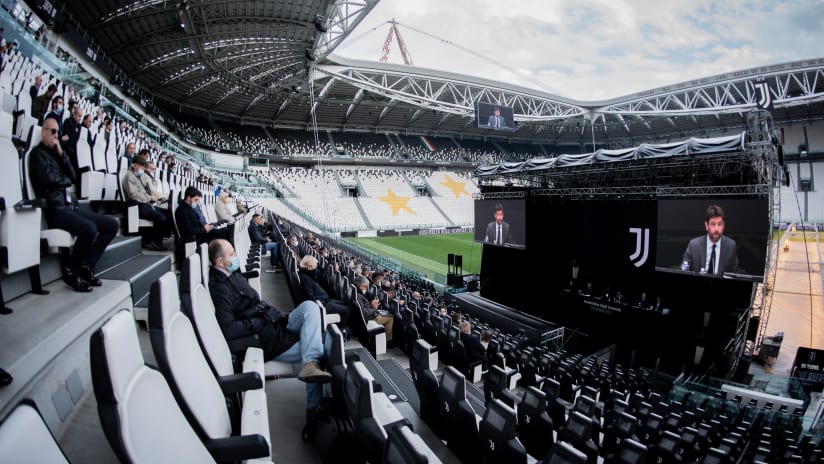
There are lots of things we could say about and I won't bore you with the impact it has had on the club's turnover and operating margins but what is certainly missing and this will be the final piece to help us analyse how big an impact this crisis has had on football is the total downsizing of the transfer market in these two years. The European transfer market generated €6.5 billion in 2019. That number is slightly inferior to the one I mentioned before because the previous one took into consideration the activities of the other confederations. So if we consider €6.5 billion in Europe, the 7.4 in the world and split the 900 million difference between CONCACAF, CONMEBOL, CAF, AFC, OFC, that gives you an idea of the importance of our area within the world.
In 2020 transfers totalled €4 billion. In 2021, this summer, €3 billion. This huge decrease will have repercussions above all on the small and medium-sized clubs who survive by selling players, especially given the decrease in traditional revenue such as stadium and commercial, so their business model as developers of talent will have a heavy impact on the 2021/22 financial reports.
Hopefully, we will return to complete normality this season, at the end of which we will be able to assess the effects of Covid across three seasons.
Looking ahead, what will Juventus do? What did Juventus do and what results were achieved between 2014 and 2018? What was the impact of Covid on the industry? We have already announced the impact of Covid on our club: the direct and indirect effects amount to €320 million, with 40% of that affecting the current financial year. We'll be able to quantify the effects of Covid at the end of this season. Your club, Juventus asked you in this meeting at the end of 2019 to approve an investment plan that began just before the entire planet was struck by lockdown
The fact that since that time people have spoken about virtually nothing but Covid and that Covid is now not such an omnipresent topic doesn't mean that its effects have all disappeared.
The investment plan we put forward in 2019 was credible and its effects would have been visible in the medium term. An expansion plan of course includes likely losses in the first few years of the plan, but that plan was credible then, it is credible now and it has every chance of taking off again thanks to the capital increase we have submitted for your approval today.
Clearly, however, the premises for that plan have changed. We've gone from 'time to think big' to a path to credibility'. And this path to credibility can be divided into five main dimensions, because Juventus must be credible in the club's long-term financial sustainability. To reinforce this principle of credibility regarding financial sustainability, our club will organise an 'Investor Day' in 2022, in which a series of targets and KPIs will be outlined that will enable you shareholders, the other investors and those who observe us to evaluate us based on precise goals which we will define over the coming months.
Of course all of this must be carefully managed. The football industry has this bad habit of measuring itself on turnover, but constantly seeking ever greater revenues doesn't necessarily equate to sound management. We will therefore focus on the middle lines, with a greater margin for the club. There's a famous saying: “Turnover is vanity, profit is sanity, but cash is king.
We should focus not on seeking turnover but on seeking profit. With the new board we will add a third dimension composed of an ASG committee. These have become common trends in recent years and the club has done a lot – the publication of our sustainability report, which you have been presented with today, is proof of that. We want to incorporate new ASG policies in the club's strategy and with the new board we will set up an ad hoc committee. This committee will be tasked, in the first year, with assessing what has been done, and will increasingly include these topics in club policies.
There will be a fourth dimension, which is political, and we must continue to lead the way in football governance. I challenge anyone to say that the current professional football system is satisfactory. I hear complaints from all quarters but what I find surprising is that every proposal, every attempt to reform the industry is cast aside, whether it relates to competitions, governance or commercial development.
Within the Italian league – but the same is true elsewhere – when commercial development policies are introduced, they either make the big clubs happy but not the smaller clubs, or the smaller clubs happy but not the big clubs.
Governance reforms are not deemed satisfactory because they shift the decision-making power from one interlocutor to another. Whenever we talk about reforming competitions, people say there are too many matches, so there should be fewer teams. This benefits some but not others. Why is this? Because no matter what proposal is made, it cannot simultaneously satisfy an entire system with so many non-homogenous actors.
The governance mechanism we have at the moment does not allow anyone to assume the leadership. Those with the votes do not have the weight and those with the weight do not have the votes. For ten years I worked honestly to change an unstable system that doesn't make the most of commercial value, which doesn't protect investors, you, and which, since 1991, has abandoned sporting merit. I'm referring to international competitions and the fact that the fourth-placed team in Italy has more rights than the champions of another country. This is not meritocratic logic; it is commercial logic.
This year Juventus, Real Madrid and Barcelona did not win their domestic league but all three are playing in the Champions League. Lots of teams who won their domestic league are not in the Champions League. The reasons for this are commercial. Those who were around at the time will remember that it was described as scandalous. There were cries of “Where's the sporting merit? What happened to football's values?” What we have done since then is create the Champions League, which is widely recognised as one of the greatest sports competitions in the world. Clearly the decisions taken at the end of the '80s and the start of the '90s – despite what people said at the time – led to change and the creation of one of the best competitions.
The birth of the Super League, which had two conditions precedent that were not given due consideration, namely reaching an agreement with UEFA and FIFA, and the possibility of organising a second or third competition, was the result of not three but 12 clubs observing the obsolete scaffolding holding up football which is rejecting change to maintain a political class that takes no risks and does not compete but wants to make the decisions and collect the cash.
In my opinion, the treachery lies in those who have always rejected dialogue regarding reforms. I don't want to give up. I didn't give up before, I don't want to give up now and I won't give up in the future. The system needs to change and Juventus want to be a part of it, but all I can do is reiterate that only through constructive dialogue will we be able to find a solution that makes everyone happy.
The fifth dimension, and here I come back to our path of credibility, must be sporting. And by sporting I mean ensuring that Juventus remain competitive. We have four sports dimensions which will be evaluated over the coming months, starting with the youth academy. The U23 team, with the director [Giovanni] Manna and the coach [Lamberto] Zauli, is an integral part of the supply chain for the first team. Now in its fourth year, we are starting to see the fruit of our work. We have players like [Nicolo] Fagioli, [Gianluca] Frabotta and [Radu] Dragusin who, after spending a year with the senior team, are now out on loan and will hopefully return and become first-team squad members.
Juventus Women, run impeccably by Stefano Braghin, won their fourth consecutive Scudetto title and we must say a special thank you to Rita Guarino, who guided the team through these first four years, instilling a winning mentality. The fact that [Joe] Montemurro's team have qualified for the Women's Champions League this season, and the fact we played Chelsea at this stadium in front of 18,000 fans a few weeks ago are signs of how big the women's game is becoming in Italy. We believed in it from the very start and now we're seeing lots of other teams in Italy following our lead. In truth, we followed the path taken by other clubs in Europe and in Italy we were once again the first.
As for the first team, the results we have achieved in recent years have been extraordinary and in many ways are unrepeatable but I don't expect Juventini, the women and men of Juventus, to be grateful or satiated. I don't expect it because I was born a Juventino and I know I can't expect from others what I can't guarantee myself. But people shouldn't lose faith in the likes of Pavel Nedved, who has been a part of this journey from the very beginning, Maurizio Arrivabene, who is here today for the first time, Federico Cherubini and above all our coach Massimiliano Allegri and a group of players who are improving.
What goes for me goes for all the women and men of Juventus. Since 2010 you can count the Italian clubs that have won a trophy on the fingers of one hand. That's something to think about. The credibility I was referring to earlier is fundamental to fuel our passion, which I can assure you has not changed in the slightest – in fact, in times of difficulty like this I think it increases. We must work together as one, remembering that the team, the group, comes before everything and everyone. I said this years ago at an Awareness Festival I attended in Milan and I'll say it again today: We are all useful but no one is indispensable. And here I can say a few words about what it meant to have the best player in the world play for us: it was an honour and a pleasure and if we think about how much Cristiano [Ronaldo] contributed to the Juve cause, we can only applaud him and thank him for giving us so much joy. Perhaps my only regret is that for a year and a half of his three years there were no fans at the stadium. [Alvaro] Morata was right when he said that it's the Juventus shirt which requires responsibility, not your team-mates. I don't feel more or less responsible depending on who works in the office with me. I feel more or less responsible based on what the club I work for represents. And Juventus Football Club is bigger than anyone who has had the honour of being a part of this journey from 1897 to now. Juventus comes before any single person.
In this time of great difficulty, we must go back to our values, to our Juventus values, the values that have guided this industrial city of ours: hard work, abnegation, sacrifice and discipline. That's what we want to see on and off the pitch because if I think of the Juventus team, it is made up of 1,700 people when it comes to organising matchday. It is these 1,700 people who will help us achieve results on and off the pitch, following our principles.
I recently came across a definition of the meaning of life by Oriana Fallaci. She said there are four meanings to life, and I think they are understood by the people who work for Juventus: love, fight, suffer and win. We must love Juventus, we must fight for Juventus and we must suffer for Juventus. But above all we must win for Juventus.

